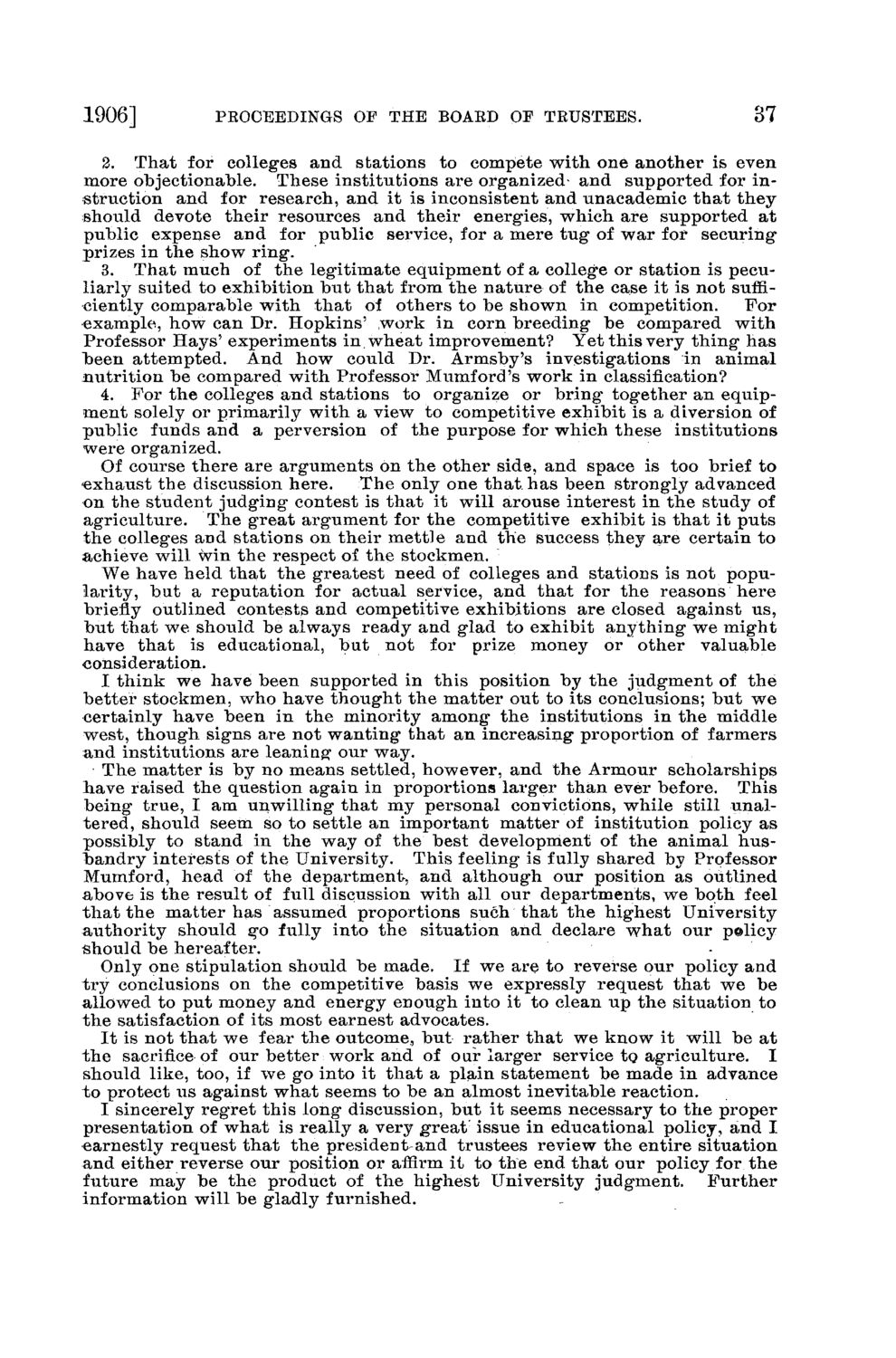| |
| |
Caption: Board of Trustees Minutes - 1908
This is a reduced-resolution page image for fast online browsing.

EXTRACTED TEXT FROM PAGE:
1906] PKOOEEDINGS OF THE BOAED OF TRUSTEES. 87 2. That for colleges and stations to compete with one another is even more objectionable. These institutions are organized- and supported for instruction and for research, and it is inconsistent and unacademic that they should devote their resources and their energies, which are supported at public expense and for public service, for a mere tug of war for securing prizes in the show ring. 3. That much of the legitimate equipment of a college or station is peculiarly suited to exhibition but that from the nature of the case it is not sufficiently comparable with that of others to be shown in competition. For example, how can Dr. Hopkins' work in corn breeding be compared with Professor Hays' experiments in wheat improvement? Yet this very thing has been attempted. And how could Dr. Armsby's investigations in animal nutrition be compared with Professor Mumford's work in classification? 4. For the colleges and stations to organize or bring together an equipment solely or primarily with a view to competitive exhibit is a diversion of public funds and a perversion of the purpose for which these institutions were organized. Of course there are arguments on the other side, and space is too brief to exhaust the discussion here. The only one that has been strongly advanced on the student judging contest is that it will arouse interest in the study of agriculture. The great argument for the competitive exhibit is that it puts the colleges and stations on their mettle and the success they are certain to achieve will win the respect of the stockmen. We have held that the greatest need of colleges and stations is not popularity, but a reputation for actual service, and that for the reasons here briefly outlined contests and competitive exhibitions are closed against us, but that we should be always ready and glad to exhibit anything we might have that is educational, but not for prize money or other valuable consideration. I think we have been supported in this position by the judgment of the better stockmen, who have thought the matter out to its conclusions; but we certainly have been in the minority among the institutions in the middle west, though signs are not wanting that an increasing proportion of farmers and institutions are leaning" our way. The matter is by no means settled, however, and the Armour scholarships have raised the question again in proportions larger than ever before. This being true, I am unwilling that my personal convictions, while still unaltered, should seem so to settle an important matter of institution policy as possibly to stand in the way of the best development of the animal husbandry interests of the University. This feeling is fully shared by Professor Mumford, head of the department, and although our position as outlined above is the result of full discussion with all our departments, we both feel that the matter has assumed proportions such that the highest University authority should go fully into the situation and declare what our policy should be hereafter. Only one stipulation should be made. If we are to reverse our policy and try conclusions on the competitive basis we expressly request that we be allowed to put money and energy enough into it to clean up the situation to the satisfaction of its most earnest advocates. It is not that we fear the outcome, but rather that we know it will be at the sacrifice of our better work and of our larger service to agriculture. I should like, too, if we go into it that a plain statement be made in advance to protect us against what seems to be an almost inevitable reaction. I sincerely regret this long discussion, but it seems necessary to the proper presentation of what is really a very great issue in educational policy, and I earnestly request that the president and trustees review the entire situation and either reverse our position or affirm it to the end that our policy for the future may be the product of the highest University judgment. Further information will be gladly furnished.
| |